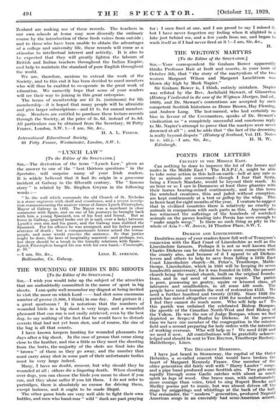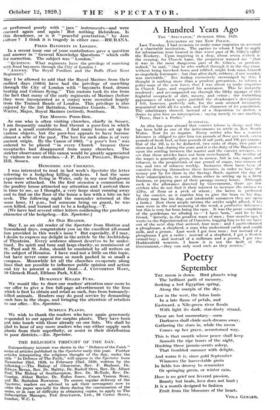POINTS FROM LETTERS
CRUELTY IN THE MIDDLE EAST.
Can nothing be done to improve the lot of the horses and mules in the Middle East ? The R.S.P.C.A. might be able to take some action in this hell-on-earth—hell at any rate as far as animals are concerned—though I fear that Syria, being a French Mandate, would be beyond their reach. In an hour or so I saw in Damascus at least three gharries with their horses bearing-reined continuously, and in this town the wretched creatures, thin and jaded without exception, are kept continuously at a trot or gallop by the whip. This in fierce heat for eight months of the year. I venture to suggest that in civilized countries there is relatively no cruelty to animals in comparison with such parts as this. Anyone who has witnessed the sufferings of the hundreds of wretched animals on the passes leading into Persia has seen enough to " make angels weep." Is there no such thing as pity in the whole of Asia ?—W. JOYCE, 18 Thurlow Place, S.W. 7.
DICKENS AND LINCOLNSHIRE.
Doubtless many of your readers knoiv full well of Tennyson's connexion with the East Coast of Lincolnshire as well as the Lincolnshire farmers. Perhaps it is not so well known that Charles Dickens can be claimed to have some connexion with the county also, and because of it I appeal to all Dickens lovers and others to help to save from falling a little East Coast Lincolnshire church—St. Peter's, Trusthorpe, Mable- Thorpe, Lincolnshire, which in 1931 will be keeping its seven hundredth anniversary, for it was founded in 1231, the present church being the second church, built on the original founda- tions, and in sad need of immediate repair. The parish is poor, possessing no gentry, squire or leisured class, all labourers and smallholders, in- all some 450 souls. The people have raised towards the cost of restoration £125. We need a. further hundred and twenty (£120). Since 1926 the parish has raised altogether over £190 for needed restoration. I feel they cannot do much more. Who will help us ? To this parish was ordained the celebrated Bishop •Bompas, the apostle of the Canadian North-West and first Bishop of the Yukon. He was the son of Judge Bompas, whom we find depicted as Sergeant Buzfuz by Dickens. At the present time we have one member of the congregation in the mission field and a second preparing for holy orders with the intention of. working overseas. Who will help us ? We need £120 and we need it now. All contributions will be gratefully acknow- ledged and should be sent to THE RECTOR, Trusthorpe Rectory, Mablethorpe, Lines.
THE DECADENT HEBRIDES..
I have just heard in Stornoway, the capital of the Outer Hebrides, a so-called concert that would have broken the heart of Margaret Kennedy Fraser. One member of the older generation did fairly well with " Harry Lauder" songs, and a pipe band produced some Scottish airs. Two girls sang rapidly through some Gaelic catches with about as much spirit as logs of wood. One brave man, with unfortunately more courage than voice, tried to sing Rupert Brooke and Shelley poems put to music, but was almost driven off the stage by sniggerings and Whistlings at the back of the hall. The remainder, the modern " generation, produced Negroid American songs in an execrably bad semiAmerican accent,
or performed poorly with " jazz " instruments—and were encored again and again ! But nothing Hebridean. Is this decadence, or is it " peaceful penetration," by Jazz culture ? I think it is tragedy in either case.—BM/RANA.
FIXED BAYONETS IN LONDON.
In a recent issue one of your contributors gave a question and answer in " General Knowledge Questions " which calls for correction. The subject was " London."
" Quismorr. What regiments have the privilege of marching with fixed bayonets through the City of London ?
" ANSWER. The Royal Fusiliers and the Buffs (East Kent Regiment)."
May I be allowed to add that the Royal Marines from their earliest days (1664) have had the privilege of marching through the City of London with bayonets fixed, drums beating and Colours flying." This custom took its rise from the fact that many of the early regiments of Marines (before they were incorporated as a corps) were recruited largely from the Trained Bands of London. This privilege is also enjoyed by the 3rd Battalion, Grenadier Guards.—R. NOEL WHITE, Major, Royal Marines (retired), Southsea.
THE MISSING POOR-BOX.
As one who is often visiting churches, chiefly in Sussex, I am frequently unable to find thereat a poor-box in which to put a small contribution. I find many boxes set up for various objects, but the poor-box appears to have become almost a relic of the past. The box for such alms is of very ancient origin. By the Canon of 1603, " a poor's box " was ordered to be placed "in every Church because these receptacles had disappeared from many churches. The stricter observance of this canon would be greatly appreciated by visitors to our churches.—J. P. BACON PHILLIPS, Burgess Hill, Sussex.
HEDGEHOG AND CHICKENS.
I was interested to read in last week's Spectator the letter referring to a hedgehog killing chickens. I had the same experience when living in Wales, only in my case full-grown hens were attacked. On the first occasion a commotion in the poultry house attracted my attention and I arrived there in time to see, as I thought, a very large stoat running away and to find on the floor of the house a hen with a bite on her neck. The following night the marauder returned at the same hour, II p.m., but someone being on guard, he was soon killed, and turned out to be a hedgehog.—T. [We have had several other letters confirming the predatory character of the hedgehog.—ED. Spectator.]
AN OLD READER.
May I, as an old reader of the Spectator from Hutton and Townshend days, congratulate you on the excellent all-round fare provided in this week's issue ? But especially, if I may, I desire to express my delight in the article by the Archbishop of Thyateira. Every sentence almost deserves to be under- lined. Its spirit and tone and large charity, so reminiscent of St. Paul and St. John, should be emulated by all writers on the subject of Reunion. I have read not a little on this topic, but have never come across so much packed in so small a compass. Meanwhile let all the churches co-operate along lines that are possible to influence public opinion and action and try to present a united front.—J. CONNORTON HART, 39 Glenesk Road, Eltham Park, S.E.9.
HUMANELY KILLED FURS.
We would like to draw our readers' attention once more to our offer to give a free full-page advertisement to the firm which is first to obtain and retail as such, furs from humanely- killed animals. Readers may do good service by demanding such furs in the shops, and bringing the attention of retailers to our offer.—En. Spectator.
SURPLUS PLANTS.
We wish to thank the readers who have again generously responded to our appeal for surplus plants. They have been put into touch with those already on our lists. We shall be glad to hear of any more readers who can either supply such plants from their superfluity, or assist in their distribution in poor districts.—En. Spectator.









































 Previous page
Previous page